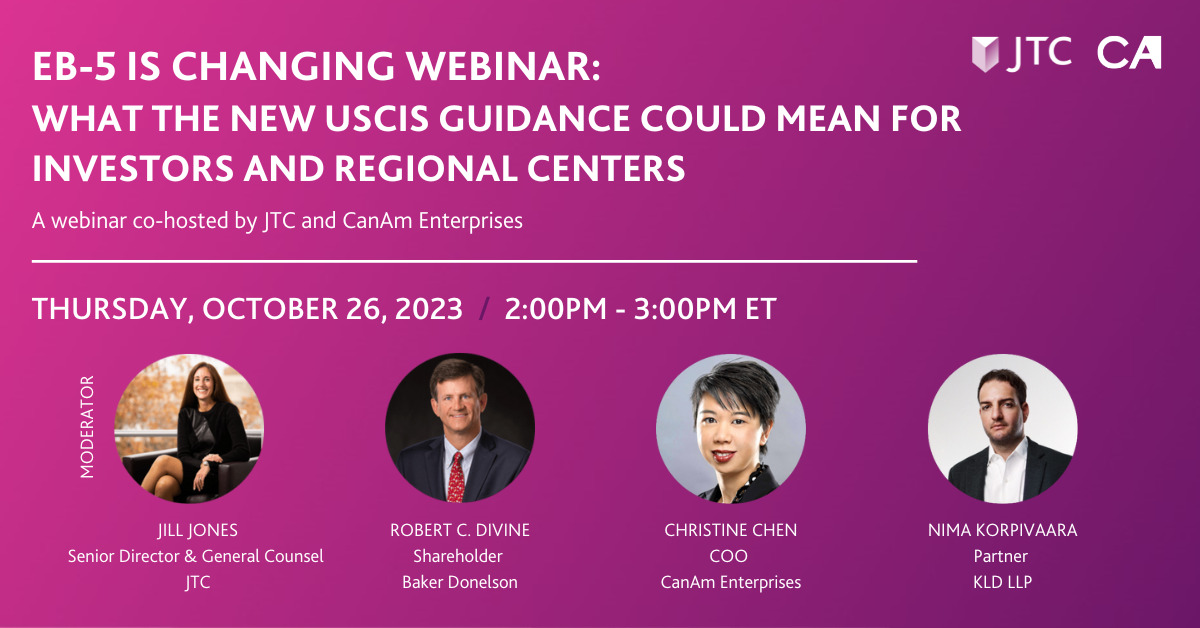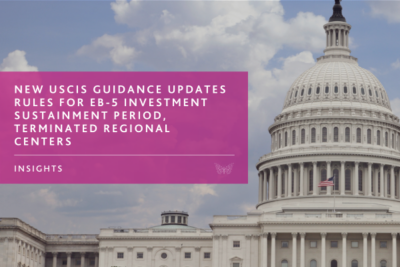EB-5 Reform and Integrity Act of 2022
The EB-5 Immigrant Investor Program has been a popular pathway for foreign investors seeking a U.S. green card. However, with the passage of the EB-5 Reform and Integrity Act (RIA) of 2022, many investors who applied pre-RIA find themselves in a difficult situation, often feeling trapped in a “limbo” while waiting for their green card approval.
Recently, CanAm sat down with Halston Chavez, an Immigration Attorney at The Galati Law Firm, to discuss the current state of the EB-5 program and offer guidance for those who are still navigating their way through the process.
You can watch the full webinar in Spanish here. In this blog post, we discuss some of the essential points covered in their discussion.
Understanding the EB-5 Program and Its Requirements
The EB-5 program was established by the U.S. Congress to stimulate the U.S. economy through job creation and capital investment by foreign investors. In exchange for making a qualifying investment in a U.S.-based commercial enterprise, investors can receive a green card, which grants them permanent residency in the United States. The minimum investment amount for the EB-5 program is currently set at $800,000 for targeted employment areas (TEAs) such as rural areas or those with high unemployment, and $1,050,000 for all other areas.
The program requires that the investment must create at least 10 full-time jobs for U.S. This requirement is critical, and the creation of these jobs must be well-documented and verified. The program’s stringent job creation requirements ensure that the investments made are beneficial not just for the investors, but also for the U.S. economy and its workforce.
Changes to the EB-5 Program with the Reform and Integrity Act of 2022
The RIA introduced significant changes to the EB-5 program to enhance transparency, accountability, and integrity within the program. Some of the key changes included:
- Increased Investment Minimums: The investment amounts have been adjusted to reflect current economic conditions. As mentioned, investments now require a minimum of $800,000 for TEAs and $1,050,000 for other areas. This increase is intended to better align the program with modern economic realities and to ensure that the investments contribute more substantially to the U.S. economy.
- Enhanced Oversight and Compliance: The RIA introduced stricter oversight and compliance requirements for regional centers, which are entities that pool EB-5 investments for development projects. Regional centers must now undergo regular audits and provide more comprehensive reporting to ensure that they adhere to the program’s rules. This change is designed to protect investors from fraud and to ensure that the investments are being used as intended.
- Visa Set-Asides and Priority Processing: The RIA also introduced a new system for setting aside a certain number of EB-5 visas for projects located in rural areas, high-unemployment areas, or infrastructure projects. This system is designed to prioritize investments in areas that are most in need of economic development.
- Good Faith Investor Protections: One of the most important changes in the new law is the introduction of protections for “good faith investors” whose regional center or project fails through no fault of their own. These investors are now allowed to reinvest in another qualifying project without losing their place in the queue for a green card. This change provides a safety net for investors who might otherwise be left without recourse if their initial investment project fails.
Challenges Faced by Pre-RIA Investors and Possible Options
Investors who filed their petitions pre-RIA are currently facing significant challenges. Many have complied with all requirements, and yet continue to wait for the approval of their green card. The backlog and slow processing times have led to frustration and uncertainty for these investors.
- Waiting It Out: The simplest option is to continue waiting. For some investors, especially those who are not in a rush or are currently residing in the U.S. under another visa category, waiting may be a feasible choice.
- Exploring Alternative Visa Options: Investors should consult with an immigration attorney to explore other visa options that might allow them to live and work in the U.S. while their EB-5 petition is pending. This could include applying for a different type of visa that fits their current circumstances and long-term plans.
- Reinvestment: If the regional center or project associated with an investor’s EB-5 petition fails or loses its designation, the new law allows investors to reinvest their funds into another qualifying project without losing their place in line. This option provides a way for investors to maintain their eligibility for a green card even if their original investment does not meet the requirements.
- Filing a Mandamus Lawsuit: One effective strategy for investors facing unreasonable delays is to file a mandamus lawsuit against the U.S. government. A mandamus action is a lawsuit filed in federal court to compel a government agency to perform a duty that it is legally required to perform. In the context of EB-5, this could mean compelling USCIS to process a delayed petition. This option has been increasingly used by investors frustrated with long wait times and has proven successful in many cases.
Final Thoughts and Encouragement for Investors
For investors currently in limbo, Halston offered words of encouragement:
“Keep the faith, seek guidance, and consult with an immigration attorney to explore your options. Not all cases are the same, and there may be a solution out there that fits your specific situation.”
While the path to obtaining an EB-5 green card may be fraught with challenges, there are avenues available to investors to protect their interests and potentially expedite the process. Staying informed, seeking expert advice, and exploring all available options are critical steps in navigating the complexities of the EB-5 program.




